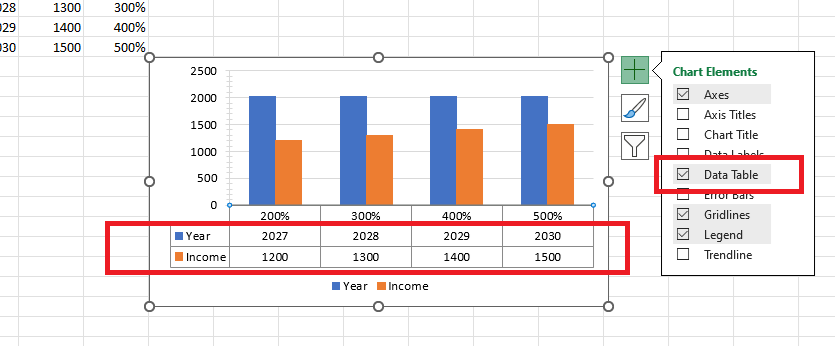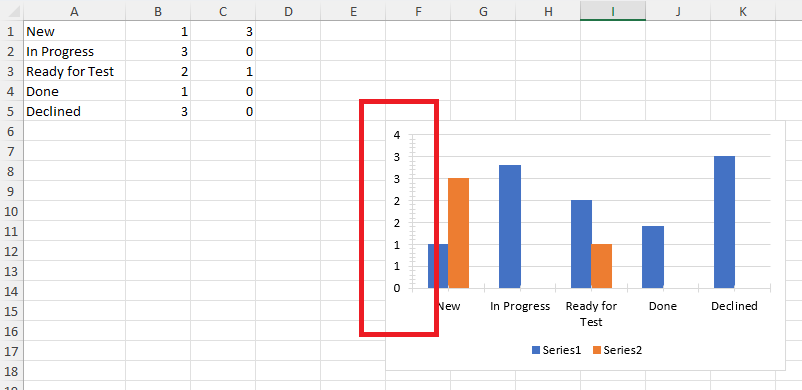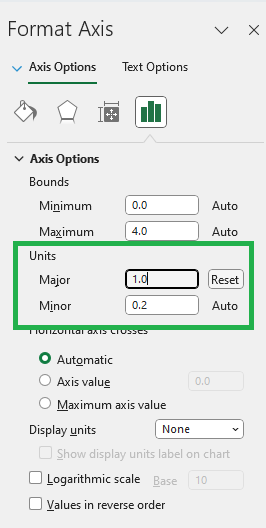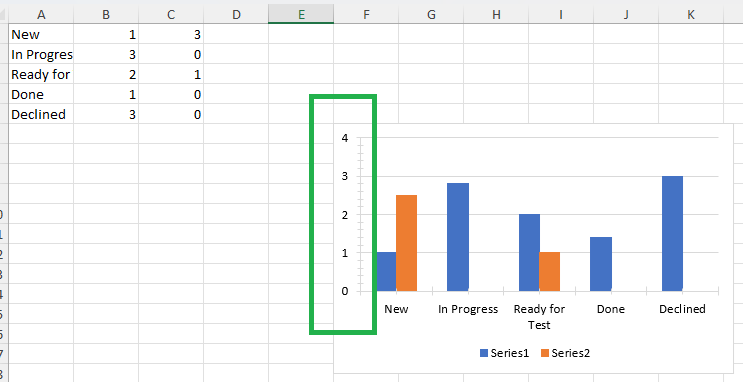Completed
Last Updated:
13 Nov 2024 08:50
by ADMIN
Release 2024.4.1106 (Q4 2024)
Created by:
Olegs
Comments:
0
Category:
SpreadProcessing
Type:
Bug Report
Built-in number formats are not reevaluated after changing the culture.
Unplanned
Last Updated:
19 Nov 2024 16:27
by ADMIN
Created by:
Tao
Comments:
2
Category:
SpreadProcessing
Type:
Feature Request
Currently, the chart is generated considering the format applied to the cells. Thus, when the decimal part is clipped, duplicated values may occur and the developer doesn't have the option to update it:
This is the code:
Workbook workbook = new Workbook();
Worksheet worksheet = workbook.Worksheets.Add();
List<string> categories = new List<string> { "New", "In Progress", "Ready for Test", "Done", "Declined" };
worksheet.Cells[0, 0].SetValue("New");
worksheet.Cells[0, 1].SetValue(1);
worksheet.Cells[0, 2].SetValue(2.5);
worksheet.Cells[1, 0].SetValue("In Progress");
worksheet.Cells[1, 1].SetValue(2.8);
worksheet.Cells[1, 2].SetValue(0);
worksheet.Cells[2, 0].SetValue("Ready for Test");
worksheet.Cells[2, 1].SetValue(2);
worksheet.Cells[2, 2].SetValue(1);
worksheet.Cells[3, 0].SetValue("Done");
worksheet.Cells[3, 1].SetValue(1.4);
worksheet.Cells[3, 2].SetValue(0);
worksheet.Cells[4, 0].SetValue("Declined");
worksheet.Cells[4, 1].SetValue(3);
worksheet.Cells[4, 2].SetValue(0);
FloatingChartShape chartShape = new FloatingChartShape(worksheet, new CellIndex(5, 5), new CellRange(0, 0, 4, 2),ChartType.Column)
{
Width = 400,
Height = 250
};
worksheet.Charts.Add(chartShape);
CellSelection cellSelection = worksheet.Cells[new CellIndex(0, 1), new CellIndex(4, 2)];
CellValueFormat specialFormat = new CellValueFormat("0");
cellSelection.SetFormat(specialFormat);
string outputFilePath = "SampleFile.xlsx";
Telerik.Windows.Documents.Spreadsheet.FormatProviders.IWorkbookFormatProvider formatProvider = new Telerik.Windows.Documents.Spreadsheet.FormatProviders.OpenXml.Xlsx.XlsxFormatProvider();
using (Stream output = new FileStream(outputFilePath, FileMode.Create))
{
formatProvider.Export(workbook, output);
}
Process.Start(new ProcessStartInfo() { FileName = outputFilePath, UseShellExecute = true });The requires options are setting the major/minor units for the axis:
Unplanned
Last Updated:
27 Jan 2025 15:00
by ADMIN
Created by:
Christopher
Comments:
2
Category:
SpreadProcessing
Type:
Feature Request

Unplanned
Last Updated:
29 Jan 2025 14:18
by Lava
Created by:
Lava
Comments:
0
Category:
SpreadProcessing
Type:
Feature Request
Introduce import/export of a single sheet.
Duplicated
Last Updated:
03 Jun 2025 13:56
by ADMIN
Created by:
Brian
Comments:
1
Category:
SpreadProcessing
Type:
Feature Request
Charts in excel have support for minor grid lines. This is not supported here.
Completed
Last Updated:
10 Oct 2025 06:11
by ADMIN
Release 2025.3.1007 (2025 Q3)
Created by:
Sailaja
Comments:
0
Category:
SpreadProcessing
Type:
Bug Report
Stacktrace:
at System.ThrowHelper.ThrowArgumentNullException(ExceptionArgument argument) at System.Collections.Generic.Dictionary`2.FindValue(TKey key) at System.Collections.Generic.Dictionary`2.ContainsKey(TKey key) at Telerik.Windows.Documents.Spreadsheet.FormatProviders.OpenXml.Xlsx.Model.Elements.Worksheets.ConditionalFormattingRuleElementX14.OnAfterRead(IXlsxWorksheetImportContext context) in C:\Work\document-processing\Documents\Spreadsheet\FormatProviders\OpenXml\Xlsx\Model\Elements\Worksheets\ConditionalFormatting\x14\ConditionalFormattingRuleElementX14.cs:line 62
Unplanned
Last Updated:
25 Sep 2017 13:56
by ADMIN
ADMIN
Created by:
Tanya
Comments:
0
Category:
SpreadProcessing
Type:
Feature Request
Now there is no public API that allows the users to check if a Worksheet is empty or not. The UsedCellRange property returns a cell range that is only the cell A1 even if it is empty too. Possible solution is to expose IsEmpty property of the CellRange. Workaround: Check if Worksheet.UsedCellRange contains only A1, and that additionally A1 is empty.
Unplanned
Last Updated:
26 Sep 2017 06:49
by ADMIN
ADMIN
Created by:
Tanya
Comments:
0
Category:
SpreadProcessing
Type:
Feature Request
The value of Worksheet.UsedCellRange could be calculated during the import of the workbook - as all cells are processed anyway. This will improve the performance of the first usage of this property, which is very common scenario. Also xlsx documents can have optional 'dimension' element which is used to specify the used cell range: <dimension ref="A1:C2"/>.
Declined
Last Updated:
28 Sep 2017 14:17
by ADMIN
ADMIN
Created by:
Todor
Comments:
1
Category:
SpreadProcessing
Type:
Feature Request
Introduce support for cell reference ranges which refer to whole columns. For example "=Sheet1$A:$A" refers to the whole column A.
Unplanned
Last Updated:
28 Sep 2017 14:45
by ADMIN
ADMIN
Created by:
Deyan
Comments:
0
Category:
SpreadProcessing
Type:
Feature Request
Create API allowing conversion of .NET standard numeric format strings to Excel/RadSpreadsheet's number formats.
For example, G3 .NET numeric format should be converted to scientific notation RadSpreadsheet mode - CellValueFormat("0.00E+00").
Completed
Last Updated:
08 Jul 2022 13:16
by ADMIN
Release R3 2022
ADMIN
Created by:
Deyan
Comments:
1
Category:
SpreadProcessing
Type:
Feature Request
Include the view property in the model in order to not be lost during import and export. The possible values for this property are normal, pageBreakPreview, and pageLayout.
Example:
<sheetViews>
<sheetView tabSelected="1" view="pageBreakPreview" zoomScaleNormal="100" zoomScaleSheetLayoutView="100" workbookViewId="0">
<selection activeCell="J5" sqref="J5"/>
</sheetView>
</sheetViews>
Completed
Last Updated:
11 Jan 2019 12:35
by ADMIN
ADMIN
Created by:
Deyan
Comments:
1
Category:
SpreadProcessing
Type:
Bug Report
When a chart is inserted in a document, generated by SpreadProcessing or WordsProcessing, the chart seems to lack any bars. The reason is that some theme information is missing, which effectively makes shapes take their default color, which is transparent. The same applies for shapes inserted in any Document Processing-generated OOXML documents - docx, xlsx. Workaround: (applicable for Excel) Manually change the theme for the document in MS Excel: - Choose Page Layout -> Themes -> Themes dropdown -> Office.
Unplanned
Last Updated:
29 Sep 2017 06:29
by ADMIN
ADMIN
Created by:
Deyan
Comments:
0
Category:
SpreadProcessing
Type:
Feature Request
Add support for theme effects (format schemes). They are described in OOXML using the 'fmtScheme' element. Thing of providing predefined sets. In MS Excel the UI for changing is located in Page Layout tab -> Themes -> Effects.
Unplanned
Last Updated:
27 Apr 2018 16:25
by ADMIN
ADMIN
Created by:
Deyan
Comments:
2
Category:
SpreadProcessing
Type:
Feature Request
Split allows you to split the window into different panes that each scroll separately. This feature is different than the horizontal/vertical split of freeze panes, which is supported.
Unplanned
Last Updated:
18 Jan 2017 07:35
by ADMIN
ADMIN
Created by:
Deyan
Comments:
0
Category:
SpreadProcessing
Type:
Bug Report
When importing and exporting xlsx document with email address hyperlink the exported document shows invalid document message when opened in Excel: "We found a problem with some content in 'file.xlsx'. Do you want us to try to recover as much as we can? If you trust the source of thes workbook, click Yes.". The document can be only partially recovered and information is lost.
Unplanned
Last Updated:
12 Dec 2016 14:47
by ADMIN
ADMIN
Created by:
Deyan
Comments:
0
Category:
SpreadProcessing
Type:
Bug Report
Steps to reproduce: 1. Enter in a cell =Today() 2. Show Format Cells dialog and set Custom format "d" Expected: The value is the day of the month. Actual: The date is formatted as short date but has to be day of the month.
Unplanned
Last Updated:
29 Sep 2017 07:17
by ADMIN
ADMIN
Created by:
Tanya
Comments:
0
Category:
SpreadProcessing
Type:
Feature Request
Add API for registering custom image decoders, e.g. for .emf and .wmf images.
Unplanned
Last Updated:
21 Sep 2017 06:37
by ADMIN
ADMIN
Created by:
Nikolay Demirev
Comments:
0
Category:
SpreadProcessing
Type:
Feature Request
Add support for the AVERAGEIF function: https://support.office.com/en-us/article/AVERAGEIF-function-faec8e2e-0dec-4308-af69-f5576d8ac642 Returns the average (arithmetic mean) of all the cells in a range that meet a given criteria: AVERAGEIF(range, criteria, [average_range]) Workaround: This could be implemented as a custom function: http://docs.telerik.com/devtools/document-processing/libraries/radspreadprocessing/features/formulas/custom-functions.html
Completed
Last Updated:
20 Nov 2020 12:25
by ADMIN
Release R1 2021
ADMIN
Created by:
Nikolay Demirev
Comments:
1
Category:
SpreadProcessing
Type:
Bug Report
The exception is thrown when importing a document that contains an empty stylesheet tag in its styles.xml part.
Unplanned
Last Updated:
04 Oct 2016 07:30
by ADMIN
ADMIN
Created by:
Nikolay Demirev
Comments:
0
Category:
SpreadProcessing
Type:
Feature Request
For example, if a user wants to set a 5x5 array of values in the worksheet he has to iterate through all the values one by one and set it to the worksheet. With that API the user should be able to set the entire array with just one method call giving it the array.



